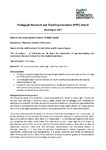A University for All Ages? An exploration of age-stereotyping and unconscious bias and its impact on the student experience.
| dc.contributor.author | Lavelle, M | |
| dc.contributor.author | Gristy, C | |
| dc.contributor.author | Haynes, J | |
| dc.contributor.other | Faculty of Arts & Humanities | en_US |
| dc.date.accessioned | 2019-03-18T15:51:32Z | |
| dc.date.available | 2019-03-18T15:51:32Z | |
| dc.date.issued | 2017 | |
| dc.identifier.uri | http://hdl.handle.net/10026.1/13490 | |
| dc.description.abstract |
Aims of project: To explore aspects of age stereotyping and age related unconscious bias on the multi-age site of Plymouth University campus. To investigate ways in which members of the PU community experience and express understandings of age. To explore how conceptions and expectations of age are shaped by the informal environment and practices, particularly those practices related to joining and becoming a member of the university community. Background/context to project: The University might be considered a space associated with ‘being’ a certain age, constructed not just with learning in mind but also a space where rites of passage from childhood to adulthood are enacted. Yet these assumptions can be problematic; unconscious age-related bias can result in unintentional discriminatory practice and missed opportunities. For those who do not fit into these aged expectations, there is the potential to feel out of place and excluded. The project explored and disrupted the notion of time and chronological time in particular. To do this we drew on the concepts of khronos, aion and kairis. Khronos is irreversible time; which has a strict order of before, now, after; it is measurable, it is the empirical material from which our narratives are often constructed. The alternative to this linear idea of time might be described as cyclical time, as in the rhythms of bodies and/or seasons. Aion refers to time as experience, duration, lived time and non-linear directionality; the continuous present of intimate intensity; it is the time of personal transformation. Kairos expresses time as opportunity, 'presencing' and manifestation, it is about timeliness and iterability (Honkanen, 2007; Kennedy and Kohan, 2017). These different concepts helped to guide our interpretations of the data and of expressions of time/age and agelessness. | en_US |
| dc.description.sponsorship | PedRIO | en_US |
| dc.language.iso | en | |
| dc.publisher | University of Plymouth | en |
| dc.subject | HE, unconscious bias, space, age, maturity, materiality | en_US |
| dc.title | A University for All Ages? An exploration of age-stereotyping and unconscious bias and its impact on the student experience. | en_US |
| dc.type | Report | en_US |
| plymouth.date-start | 2016-2017 | en_US |


